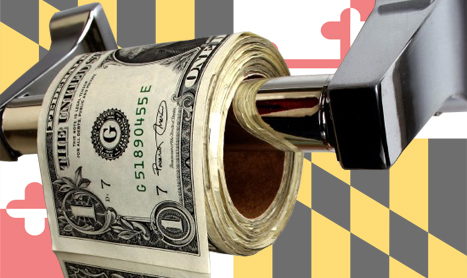ANNAPOLIS – A number of legislators are concerned that Gov. Martin O’Malley’s proposal to raise the flush tax from $2.50 to $5 a month to help clean up the Chesapeake Bay could be too much for constituents to handle, especially in a bad economy.
The flush tax, which raises funds for updates of wastewater treatment plants, as well as septic systems and stormwater management, costs each household a total of $30 a year. But O’Malley’s proposal for the Bay Restoration Fund ties the fee to consumption, with $5 being the average that most people will pay per month.
Those who use less water could pay less, but high-volume users could pay upwards of $60 a year.
Though many legislators agree that the Chesapeake Bay is a priority, they also have to consider what this would mean for Maryland residents.

“Believe me, I’m on the side of cleaning the bay up,” said Delegate Jay Jacobs, R-Kent. “But it’s going to be a very difficult year for me to vote for any increase.”
Jacobs said he is not opposed to the fee, but based on feedback from his constituents, he doesn’t feel that an increase is the right choice at this time.
Proponents of the increase argue that if the flush tax is not at least doubled, there are a number of wastewater treatment plants that would not have the same funding opportunities as others in the state.
Some facilities have already been upgraded while others are waiting for necessary modifications, said Alison Prost, the Chesapeake Bay Foundation’s Maryland executive director.
In addition to supporting O’Malley’s plan, the Chesapeake Bay Foundation is calling for an additional doubling to $10 a month. This would allow jurisdictions to start better addressing the problem of stormwater, which is a serious issue because it runs off when it rains, sending pollutants into drinking water and the bay, Prost said.
“Without additional dedicated funding for stormwater, we are not going to get the job done,” Prost said.
Sen. Richard Colburn, R-Dorchester, said he recognizes the importance of the flush tax, but opposes the increase at this time.
“I can say that the Bay Restoration fee has been used beneficially for a lot of wastewater treatment plants. It has been well utilized, and has given us money that we wouldn’t have had otherwise,” Colburn said.
Legislators are particularly concerned about the flush tax being tied to water consumption, and the impact that could have on rural areas and industries such as farming, which require a lot of water.
Sen. Jim Mathias, D-Worcester, said he wants to hear the debate about the increase in the flush tax before making up his mind. He said he is open-minded and recognizes this could be beneficial to the Eastern Shore where tourism and the fishing industry rely on clean water.
But Mathias worries about the financial burden on families and businesses.
“When we did the initial flush tax, it was a different economy,” Mathias said.
Capital News Service’s Amanda Yeager contributed to this story.


You must be logged in to post a comment.